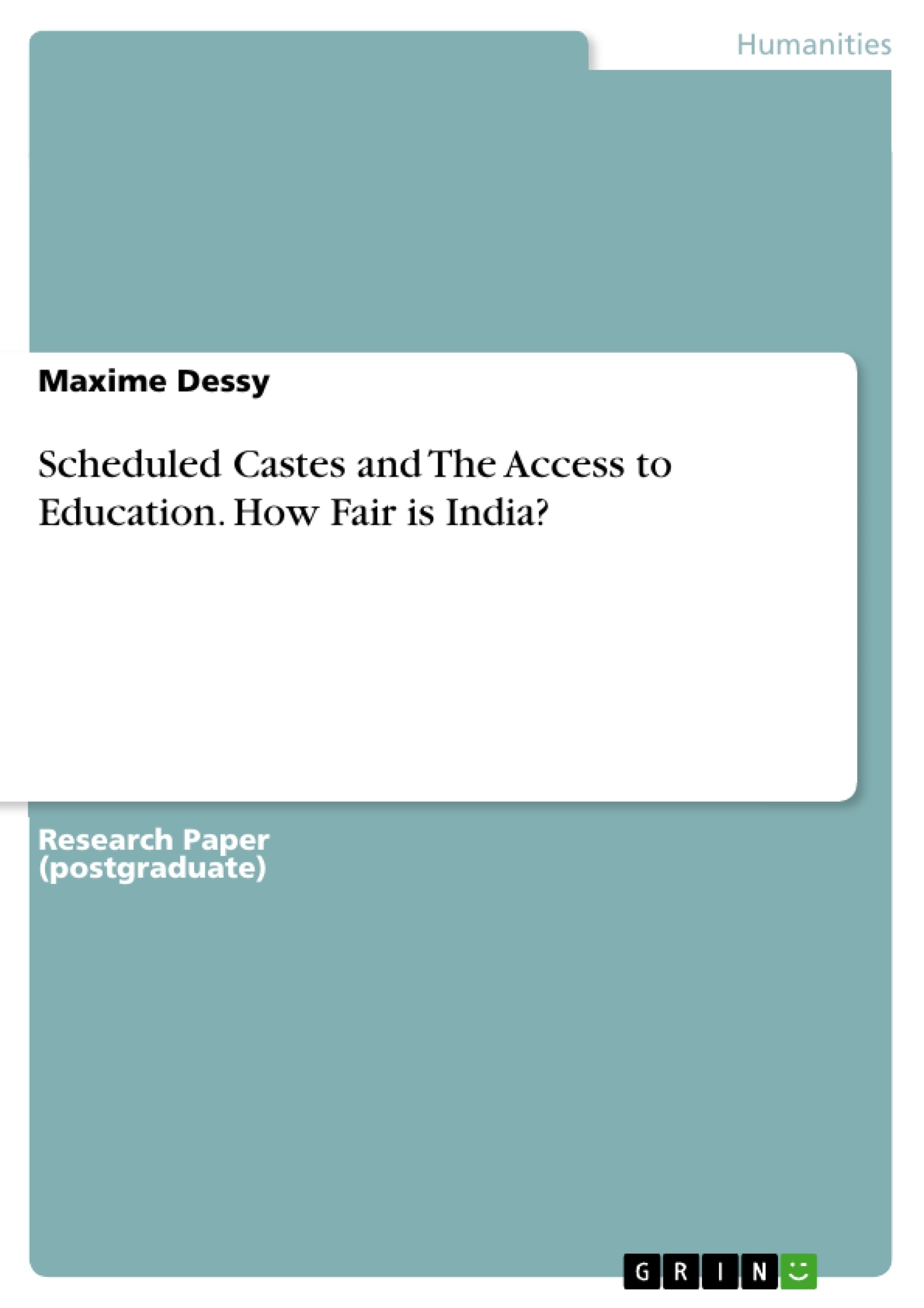In this paper, I try to analyse the fairness of Scheduled Classes’ access to education. The paper starts with giving some introductive information about the cast system. Putting together the findings of several academic articles, different factors are then discussed such as the literacy level and school attendance of Dalit Children, the discriminative behaviours they face, some other important variables, the governmental initiatives and the discrimination on the labour market. It appears clearly that caste membership is still an important discriminative factor with regards to Dalit children’s access to education.
Inhaltsverzeichnis (Table of Contents)
- Introduction
- Problem Formulation and Methodology
- An overview of the Indian castes system
Zielsetzung und Themenschwerpunkte (Objectives and Key Themes)
This paper examines the fairness of Scheduled Classes' access to education in India, exploring the ongoing trends and obstacles that impact their progress. It seeks to understand the complexities of the caste system and its influence on educational opportunities, ultimately aiming to shed light on the path towards a more equitable and inclusive society.
- The persistence of the caste system in India despite its legal abolition.
- The impact of caste discrimination on the access to education for Dalit children.
- The role of governmental initiatives and societal changes in addressing caste-based inequality.
- The challenges faced by Dalit individuals in the job market, even after attaining education.
- The potential for a more democratic and inclusive India by overcoming the caste issue.
Zusammenfassung der Kapitel (Chapter Summaries)
- Introduction: This section provides a background on the caste system in India, highlighting its historical origins and its enduring impact on Indian society despite constitutional guarantees of equality. The chapter explores the paradoxical co-existence of democracy and social inequalities, demonstrating how the caste system continues to shape various aspects of Indian life, particularly in rural areas.
- Problem Formulation and Methodology: This chapter outlines the research question and the methodology employed in the paper. It aims to analyze the extent to which India has achieved equality with regards to Scheduled Classes' access to education, considering both historical perspectives and contemporary trends. The chapter emphasizes the importance of understanding the obstacles hindering progress and the potential solutions to address the societal challenges.
- An overview of the Indian castes system: This chapter provides a detailed explanation of the Indian caste system, tracing its roots in the ancient texts of Hinduism and its development over time. It delves into the concepts of Varna and Jâti, highlighting the hierarchical nature of the system and the social restrictions imposed on different castes. The chapter also discusses the concept of sanskritisation, a process of upward mobility that allows lower-caste individuals to improve their social standing.
Schlüsselwörter (Keywords)
This paper focuses on key topics like the caste system in India, Scheduled Classes, Dalits, access to education, discrimination, societal inequalities, governmental initiatives, and the socio-economic development of India. It delves into the challenges and opportunities in achieving social justice and promoting inclusivity in education and employment for marginalized communities.
Frequently Asked Questions
What are "Scheduled Castes" in the Indian context?
Scheduled Castes (SCs), often referred to as Dalits, are groups of people who have historically faced social exclusion and "untouchability" in India. They are officially recognized by the Indian Constitution for affirmative action programs.
How does the caste system still affect education in India?
Despite legal abolition, caste remains a significant barrier. Dalit children often face discriminatory behavior in schools, lower literacy rates, and lower attendance due to socio-economic factors and deep-seated prejudices.
What is the concept of "Sanskritisation"?
Sanskritisation is a process of social mobility where lower castes or tribes attempt to improve their social standing by adopting the customs, rituals, and way of life of higher castes (traditionally the Brahmins).
What are the main obstacles for Dalit children in schools?
Key obstacles include teacher bias, social exclusion by peers, lack of financial resources, and the need for children to contribute to family labor, especially in rural areas.
Does education guarantee equality for Dalits in the labor market?
No, discrimination often persists even after graduation. Highly educated Dalit individuals may still face bias in hiring processes and career advancement compared to their counterparts from higher castes.
What role does the government play in addressing these inequalities?
The Indian government has implemented reservation systems (quotas) in educational institutions and public sector jobs, along with various welfare schemes to promote the socio-economic development of marginalized communities.
- Quote paper
- Maxime Dessy (Author), 2008, Scheduled Castes and The Access to Education. How Fair is India?, Munich, GRIN Verlag, https://www.grin.com/document/145293



